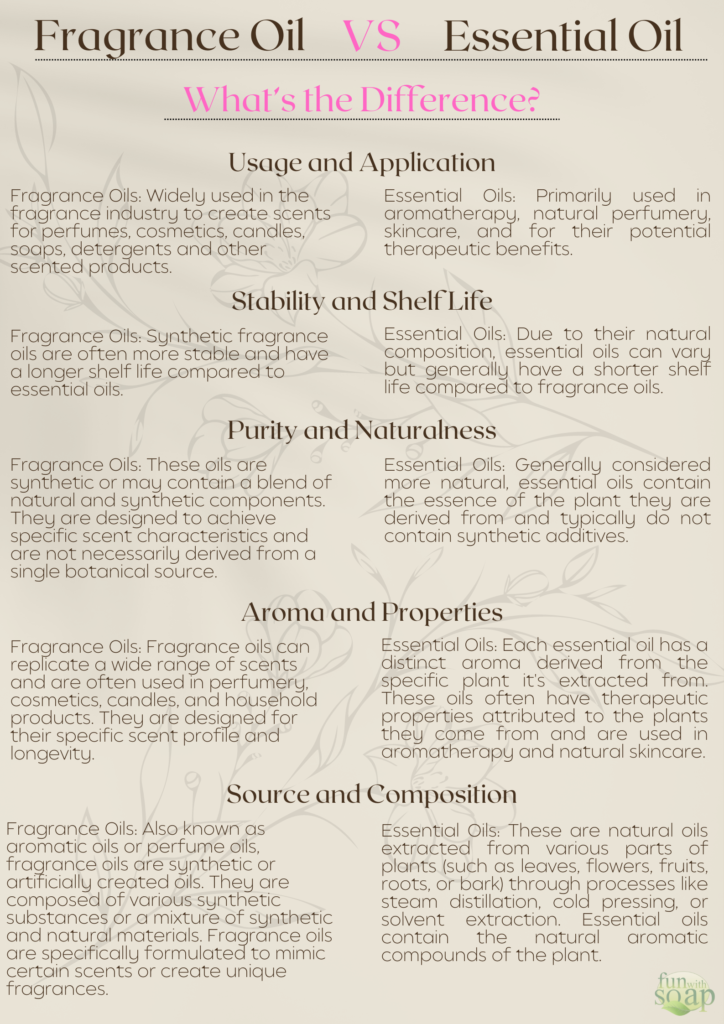Blogs + Announcements
Essential Oils vs. Fragrance Oils
Essential Oils vs. Fragrance Oils: Understanding the Differences
Essential Oils vs. Fragrance Oils – world of aromatics can be both fascinating and overwhelming, especially when it comes to choosing between essential oils and fragrance oils.
Though they may seem similar at first glance, these two types of oils have distinct characteristics, origins, and uses.
This blog will help you understand the key differences between essential oils and fragrance oils, enabling you to make informed decisions for your aromatic needs.
1. Origin and Composition
Essential: Essential oils are natural extracts derived from plants. They are obtained through processes like steam distillation, cold pressing, or resin tapping.
These oils capture the essence, aroma, and beneficial properties of the plant.
Examples include lavender, peppermint, eucalyptus, and tea tree oil. Each essential oil contains a complex mixture of organic compounds, giving it unique therapeutic properties.
Fragrance: Fragrance oils, on the other hand, are synthetic or partially synthetic blends designed to mimic natural scents or create entirely new aromas.
They are formulated in laboratories using a combination of essential oils, aroma chemicals, and other ingredients.
Fragrance oils offer a wide range of scents, including those not found in nature, such as “ocean breeze” or “cotton candy.”
2. Uses and Applications
Essential Oils: Essential oils are widely used in aromatherapy, natural skincare, and holistic healing practices. They are prized for their therapeutic benefits, such as stress relief, improved sleep, and enhanced mood. Essential oils can also be used in natural cleaning products and homemade beauty recipes.
Fragrance Oils: Fragrance oils are commonly used in the cosmetic and home fragrance industries. They are found in products like candles, soaps, lotions, and perfumes. Because they are engineered to be long-lasting and stable, fragrance oils are ideal for scenting products where a specific, consistent aroma is desired.
3. Health and Safety Considerations
Essential: Due to their natural origin, essential oils are often perceived as safer and healthier. However, they are highly concentrated and should be used with caution. Some essential oils can cause skin irritation, allergic reactions, or adverse effects if used improperly. It’s crucial to dilute essential oils with a carrier oil before topical application and to consult a healthcare professional when using them for therapeutic purposes.
Fragrance: Fragrance oils are generally considered safe for use in personal care products, but they can sometimes contain synthetic chemicals that may cause skin sensitivity or allergic reactions in some individuals. When purchasing fragrance oils, look for high-quality, skin-safe options, and always perform a patch test before widespread use.
4. Environmental Impact
Essential Oils: The production of essential oils has a significant environmental footprint. It takes large quantities of plant material to produce small amounts of oil. For example, it requires approximately 242,000 rose petals to produce 5 mL of rose essential oil. Sustainable sourcing and ethical harvesting practices are crucial to minimize the environmental impact.
Fragrance Oils: Fragrance oils, being synthetically produced, do not rely on large quantities of natural resources. This can make them a more sustainable option in terms of raw material usage. However, the production of synthetic chemicals and the environmental impact of their manufacturing processes should also be considered.
5. Cost
Essential: Due to their natural extraction processes and the volume of plant material required, essential oils are often more expensive than fragrance oils. The price can vary significantly depending on the rarity and yield of the plant.
Fragrance: Fragrance oils are typically more affordable than essential oils. Their synthetic nature and mass production capabilities make them a cost-effective option for consumers and manufacturers alike.
Conclusion – Essential Oils vs. Fragrance Oils: Understanding the Differences
Both essential oils and fragrance oils have their unique benefits and applications. Essential oils are ideal for those seeking natural, therapeutic benefits and are willing to invest in high-quality, sustainably sourced products. Fragrance oils, with their wide variety of scents and affordability, are perfect for creating consistent, long-lasting aromas in personal care and home fragrance products.
When choosing between essential oils and fragrance oils, consider your specific needs, preferences, and the intended use of the oil. By understanding the differences, you can make informed decisions that enhance your well-being and enjoyment of aromatic experiences.

